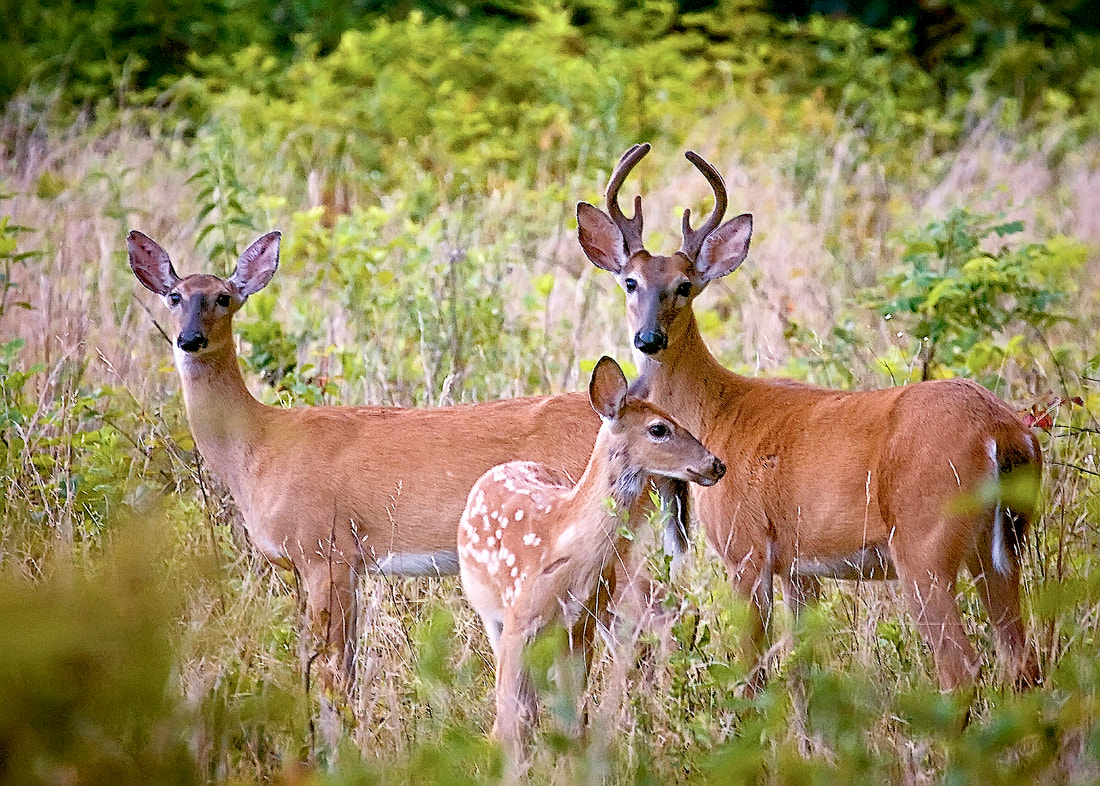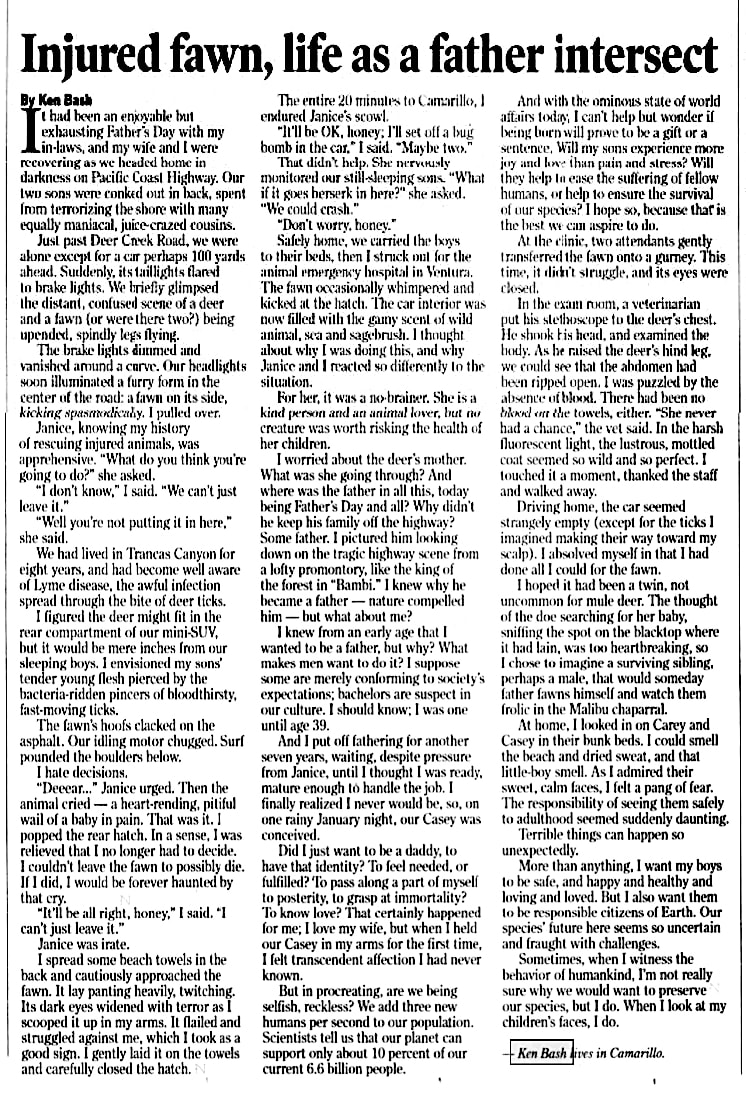|
It had been an enjoyable but exhausting Father's Day gathering with my in-laws, and my wife and I were silent as we drove home to Camarillo from Manhattan Beach. Our sons, infant Carey and toddler Casey, were conked out in back, totally spent from terrorizing the shore with many equally maniacal, juice-crazed cousins. We had chosen Pacific Coast Highway over the dreaded 405 and 101. It was late at night as we cruised through Malibu proper and passed Trancas Canyon, where Janice and I had once lived, to what is, in daylight, probably one of the most beautiful stretches of highway in the world. On our left the waves of the Pacific crashed gently on the rocks, and to the right the foothills of the Santa Monica Mountains rose steeply. Just past Deer Creek Road we were alone on the coast-hugging curves except for a car perhaps 100 yards ahead. Suddenly, puzzlingly, its taillights flared to brake lights. We briefly glimpsed in the headlights’ glare the confused scene of an adult deer and a smaller deer (or were there two?) upended, and flailing, spindly legs flying into the air. The brake lights dimmed and the car accelerated up the highway. We proceeded tentatively, afraid of what we would find. Our headlights soon lit the furry shape of a small fawn, lying in the center of the road, its legs kicking in spasms. I pulled over onto on the shoulder and rolled down my window. Janice, knowing my history of rescuing injured animals, was apprehensive. "What do you think you're going to do?" she asked. "I don't know," I said. "We can't just leave it." "Well you're not putting it in here," she said, with a tone best described as firm. In the eight years we lived in Malibu we had become well aware of Lyme disease, the awful infection spread through the bite of deer ticks. On a hike we had encountered the carcass of a fallen deer, its hide covered with hundreds of the swollen parasites. We knew that the bite of one tiny blacklegged tick could doom the victim to horrible symptoms including painful arthritis, heart problems, and nervous system damage. Our car was a mini-SUV. I figured the deer might fit in our rear compartment, but it would be mere inches from our two sleeping boys. I envisioned my sons' tender young flesh pierced by the bacteria-ridden pincers of bloodthirsty, fast-moving ticks. The fawn’s hoofs clacked on the asphalt as the animal writhed intermittently. Our idling motor chugged. Waves crashed on the rocks below. I hate decisions. I avoid them whenever I can. I'm not a decider. Then the animal cried--a heart-rending, pitiful wail of a baby in pain. That was it. I popped the rear hatch. In a sense, I was relieved. I couldn’t leave the fawn to die in the middle of the road. I knew that if I did, I would be forever haunted by that cry. "It'll be all right, honey," I said as I got out. "I can't just leave it." Janice was irate; for a moment I feared she might jump into the driver's seat and speed away. The back of the car held nothing but sandy beach towels. I spread them out and cautiously approached the fawn; I knew it would not welcome me as rescuer. It lay panting heavily, twitching. Its dark eyes widened with terror as I scooped it up in my arms. It flailed and struggled against me, which I took as a good sign. Its fur was not as coarse as I expected. I gently laid the animal on the towels, tucked up its legs, and carefully closed the hatch. The entire 20 minutes to Camarillo I endured Janice's scowl. "It'll be okay, honey; I'll set off a bug bomb in the car," I said. "Maybe two." That didn't help. She nervously monitored our still-sleeping sons. “What if it goes berserk in here?” she asked. “We could crash.” “Don’t worry, honey.” Safely home, Janice and I carried the snoring, sweaty-headed boys to their beds, then I struck out for the all-night animal emergency hospital in Ventura. I had taken sick and wounded sea lions and sea gulls to them before, after hours, when the wildlife rescue agency wasn't answering their phone. The fawn occasionally whimpered and kicked at the hatch. The car interior was now filled with the gamy scent of wild animal, sea and sagebrush. As I drove, ruminator that I am, I thought about why I was doing this, and why my wife and I reacted so differently to the situation. For her, it was a no-brainer. Although she is a kind person and an animal lover, no creature was worth risking the health of her children; maternal instinct trumped all other concerns. Was I a bad father for subjecting my children to risk? I suppose men are just generally more likely to take risks than women, especially in the case of this woman, who has a deathly horror of anything crawling or buzzing. I thought about the deer’s mother, missing her child. Had she observed my rescue and regarded it as abduction? And where was the buck in all this, today being Father’s Day and all? Why didn't he keep his family off the highway? Some father. I pictured him looking down on the tragic scene from a lofty promontory, like The King of the Forest in "Bambi." I knew why The King became a father--nature compelled him. But what about me? I knew from an early age that I wanted to be a father, but why? What makes men want to do it? I suppose that many are merely conforming to society's expectations; bachelors are somehow suspect in our culture. I should know; I was one until age 39. And I put off fathering for another seven years, waiting, despite pressure from Janice, until I thought I was ready, mature enough, to handle the job. I finally realized I never would be, so, on one rainy January night, our Casey was conceived. Did I just want to be a Daddy, to have that identity? To feel needed, or fulfilled? To pass along a part of myself to posterity, to grasp at immortality? To know love? That certainly happened for me; I love my wife, but when I held our Casey in my arms for the first time I felt transcendent affection I had never known. And then there was that day I came home from work and he immediately crawled to me, hugged my knee and babbled, "Da-da!" "Okay, honey," I said to Janice through my tears. "We're keeping him." But in procreating are we being selfish and harmful? We add three new humans per second to our population. Scientists tell us that our planet can support only about ten percent of our current 6.6 billion people. (Since this was written in 2006, that figure has risen to more than 8 billion.) In any case, Earth would be much better off with fewer of us on it. And with the ominous state of world affairs today, I can’t help but wonder if being born will prove to be a gift or a sentence. Will my sons experience more joy and love than pain and stress? Will they help to ease the suffering of fellow humans, or help to insure the survival of our species? I hope so, because that is the very best we can aspire to do. When I reached the clinic I told the receptionist I had an injured deer in my car. Two attendants came out with a gurney, and gently transferred the fawn onto it. As we wheeled the animal in, past the stares and sympathetic utterances of pet owners in the waiting room, I noticed it wasn't moving as much as before, and its eyes were now closed. I followed into a large exam room. A veterinarian immediately came in, put his stethoscope to the animal's chest, and listened. Then he repositioned the instrument and listened again. Shaking his head slightly, he took off his stethoscope and examined the body. When he raised the deer's hind leg, we could see that her abdomen had been ripped open, exposing intestines. I was puzzled by the lack of blood. There had been no blood on the towels in the car, either. "She never had a chance," the vet said. In the harsh fluorescent light the lustrous, mottled coat looked so wild and so perfect. I touched it a moment, thanked the staff and walked away. I didn’t ask about the disposition of the body. I didn’t want to know. Driving home, the car seemed especially empty (except for the ticks making their way towards my scalp). I absolved myself in that I had done all I could for the fawn, and I thought about the doe whose daughter had been taken from her. Perhaps I should have carried the body back to those hills, so that the mother might find it and have what we humans call closure. I hoped that the fawn had been a twin, not uncommon for mule deer. The thought of the doe wandering the coast in search of her lost baby, or sniffing the spot on the blacktop where it had lain, was too heartbreaking, so I chose to believe that there was a surviving sibling, upon which the mother could focus her attention and instincts. Perhaps it was a young buck that would survive to someday father fawns himself, and watch them frolic in the Malibu chaparral. At home, I looked in on Carey and Casey asleep in their bunk beds. I could smell the beach and dried sweat, and that little-boy smell. As I watched my sons softly breathing, and admired their calm, angelic faces, I felt a pang of fear. The responsibility of seeing them safely to adulthood seemed suddenly daunting. Terrible things can happen so unexpectedly. Like all fathers, I want my children to be happy and healthy and loving and loved, but I also want them to be responsible citizens of Earth. Our species’ future seems so uncertain and fraught with challenges. Sometimes, when I compare the animal world and the human world, and witness the behavior of humankind, I'm not really sure why we would want to preserve our species, but I do. When I look at my childrens’ faces, I do. ------------------------------------------------------ Copyright 2023 Ken Bash As published in The Ventura County Star, June 18, 2006
0 Comments
Leave a Reply. |
Welcome
Please feel free to leave a Comment. Archives
July 2023
Categories |


 RSS Feed
RSS Feed